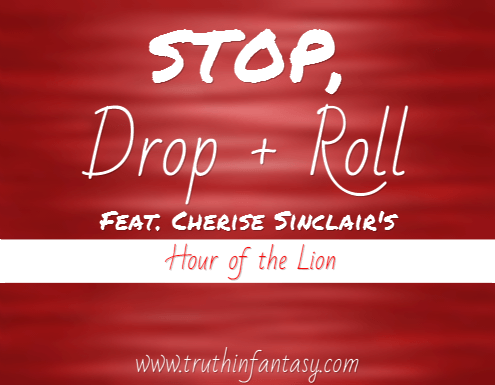I'm enjoying Hour of the Lion, the first of two shapeshifter books by Cherise Sinclair. I've read some of Ms. Sinclair's non-fantasy novels about alternative lifestyles, which are quite good (thank you, Laurell Hamilton. After reading your work I am always open to more variety in my literary life), and so far, her fantasy work does not disappoint.
One of the central conflicts in Hour of the Lion is an ailing drug kingpin’s desire to co-opt the magic of shapeshifters to cure his degenerative illness. Because Ms. Sinclair's story involves a bad guy coercing magic from unwilling shapeshifters, I'm guessing that he won't get the his HEA, but we shall see. What struck me about this trope was the visceral fear and fundamental lack of acceptance by the drug kingpin of his inevitable decline and eventual demise. I find myself spending more and more time thinking the same type of thoughts, sadly—as the contemplation of deterioration and death is not the most productive or pleasant of pastimes. But I find it increasingly difficult to avoid reminders of sickness and mortality for a variety of disquieting reasons. And while I can certainly relate to his fear, and maybe even his desire for a magical solution to the problems of decreasing quality of life as we head toward the grave, I do know that I don't share the villain’s willingness to go to any length to avoid them.
I don't watch much TV (too busy reading and writing!) and what I do watch is usually On Demand or recorded so that I can avoid or fast-forward through commercials. So I was surprised anew as I sat in my husband's office the other day and idly turned my attention to the TV screen where he keeps MSNBC on in the background throughout his day to stay informed about markets and world events. So many of the commercials were for medications to treat all manner of nasty diseases. Which got me thinking about other new developments in American life, including ubiquitous cancer centers, dialysis centers, medical imaging places and other evidence that we are far sicker than we used to be. I will forgo an exposition on my personal theories behind the rise of these phenomena—at least for now—and simply say these ads and about locations and medications to treat illness are a constant reminder that decrepitude is right around the corner. According to the commercials I saw, my physical and cognitive health is in immediate danger of irreversible decline. And the hits just keep on coming.
I watched my father's health decline as Lou Gherig's disease robbed him of life slowly and painfully. His eventual death was merciful, delivering him from the body that betrayed him. I was grateful that my mother died suddenly and quickly before the last of her dignity was stolen by an inability to live independently. I'm watching my mother's surviving, but rapidly aging, sisters as they progress through their own cycles of disease and decline. It's heartbreaking. I'm left with the unappealing choice of whether it is better for the body or the mind to go first. Sucks any way you think about it.
I want to live to a ripe old age, feeling good and thinking clearly until I drop dead – and I mean this literally, I want to stop, drop and roll belly up in my tracks. Or, not wake up one morning (with apologies to to my husband if he is the one trying to wake me). That kind of good life and quick death doesn't seem to happen very often nowadays. One can't go to the doctor without a new diagnosis for which there happens to be some innovative, grossly expensive medication or treatment. I'm not a fan. And all of these reminders – the commercials, the diagnoses, the proliferating hospitals—just feed our fear of our decline toward death—which is exactly what they are designed to do.
Why? Because fear leads to desperation that in turn leads to poor choices. Like the poor course of action the villain in Hour of the Lion initiates when he traps and tortures shapeshifters to learn the secret of their magic. A bad choice that I'm sure won't end well for him. But not too different from some of the choices we make to cling to life at any cost. We subject ourselves to torturous treatment to stave off the effects of physical and cognitive decline. You don't get anything for nothing in this world (except sometimes love, which is wonderful), and most "healing" modalities come with a very steep price tag in the form of side effects and negative consequences.
To my way of thinking, much of the time, the cure is worse than the disease. And the thought that someone is going to have to change my diapers and feed me to keep me alive – technically at least - is horrifying. The idea that I won't be able to think clearly or express myself anymore is also beyond depressing. Being aware of the slow deterioration of my faculties seems like a fate worse than death. And death seems pretty undesirable too. A no-win situation if ever there was one.
Getting old is not for the fainthearted, but it beats the alternative under certain circumstances. One way to ruin it call is to suck the joy right out of the present moment by thinking about all the ways that future moments might suck. So, best to just say ‘no’ to the negativity and naysayers. And stop watching commercials. Or reading magazines. Or looking out the window at a landscape pockmarked by medical facilities. Perhaps spending time in gratitude that such is not my current reality and having some faith that I'll have the wherewithal to deal with whatever gets thrown my way might be the best way to face my (likely) path to infirmity. Without resort to desperate measures or trying to highjack someone else's magic.

